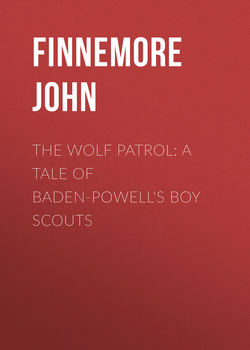Читать книгу The Wolf Patrol: A Tale of Baden-Powell's Boy Scouts - Finnemore John - Страница 2
CHAPTER II
THE FOUNDING OF THE WOLF PATROL
ОглавлениеOn the next Monday evening Dick burst into his uncle's house like a whirlwind. Mr. Elliott was in his 'den,' reading the paper, and he looked up with a smile as the boy entered.
'Oh, uncle,' cried out Dick, 'can't we begin scouting at once? It's the jolliest thing I ever heard of, and all my chums think the same. We'd like to make up a patrol at once. And you said you'd lend us a hand, didn't you?'
'I did, Dick,' said his uncle, laying aside his paper. 'When is your next half-holiday?'
'We get Tuesdays, Thursdays, and Saturdays half-holidays in the week,' said Dick.
'All right,' said his uncle. 'I'll give you Thursday afternoons till you're on your own legs. Bring your men up here on Thursday afternoon at three.'
At the time named eight boys turned up, each with an eager look on his face, and a copy of the first part of 'Scouting for Boys,' which he had thumbed from end to end.
'Well, you're not scouts yet,' said Mr. Elliott to them, 'for you have to pass the tests, you know.'
'We've been at work on them already, uncle,' replied Dick. 'We can most of us do the first test – the knot-tying – and the last three are easy enough.'
'Very good,' said Mr. Elliott. 'Then I'll try you here on Tests 1, 4, and 6 – the knots, the laws and signs of scouts, and the Union Jack test.'
He took them in turn, and put everyone through his facings, and all came through in good shape.
'Now for Test 2,' said Mr. Elliott – 'to "track a deer's spoor, or describe a shop window." Which will you have?'
'The spoor! the spoor!' cried the boys.
'Then we'll go on to the heath,' said he.
Twenty minutes' walk brought them clear of the houses, and the road ran on through a great heath which stretched for several miles and was quite unenclosed. The party struck into a side-path, and soon gained a quiet spot. Here Mr. Elliott produced a pair of tracking-irons, which the boys examined with the most eager interest, and prepared to test the band one after another.
It was a capital place for the purpose, for clumps of gorse and holly were thickly scattered over the heath, affording excellent cover, and through these clumps the trainer would lay a track which each boy must follow for a quarter of a mile, and make the journey within fifteen minutes.
Five boys were successful, among these being Arthur Graydon and Dick Elliott. Three boys failed, not because their eyesight was poorer than that of the rest, but simply because they were unobservant, and did not pick up the trail quickly at one or two points where Mr. Elliott laid little traps for them, for he did not believe in making the test too easy.
'Well,' said Dick's uncle, 'five of you rank as second-class scouts now, and can make a beginning with a patrol; the other three will qualify next time, I expect.' And he took the failures in hand and showed them where they had slipped up in tracking his spoor. Mixed with instruction, he told them stories of the wonderful tracking he had seen performed in South Africa by both white men and natives, and the afternoon passed all too quickly for the deeply interested boys.
'What shall we call our patrol?' asked George Lee, one of the successful boys in passing the tests, as they walked home.
'I vote for Wolf!' cried Dick – 'the Wolf Patrol! That sounds jolly, I think.'
'Yes, we'll have that – the Wolf,' said Arthur Graydon.
'We must wait a little,' said Mr. Elliott, 'and see if any other patrols have been formed in Bardon. It won't do to clash, but I'll see about that.'
Mr. Elliott made inquiries, and found that though there was some talk of forming patrols here and there, yet not one was actually in existence in the neighbourhood. So Dick and his friends became 1st Bardon Troop, Wolf Patrol, and were very proud of that fact.
The Wolf Patrol now turned to with a will to convert themselves from second-class scouts into first-class. Arthur Graydon was chosen patrol leader, and Dick Elliott was the corporal. Whenever the Wolves met each other they gave the scouts' salute with great care, the rank and file receiving the secret sign in half-salute, while Arthur Graydon, as patrol-leader, was greeted with the full salute. Their pocket-money went like water for patrol flags, badges, crests, and tracking-irons, and every boy rigged himself up with khaki shorts and a khaki hat with broad brim, in proper scouts' style. Above all, they practised without ceasing the wolf's howl, which was the secret call of their patrol. Several of the Wolf Patrol lived quite near to each other, and at night they would go into their gardens, and scout would howl to scout in such mournful, long-drawn notes that peaceful, elderly gentlemen, reading the evening paper after dinner, rushed out to see if murder was being done somewhere.
